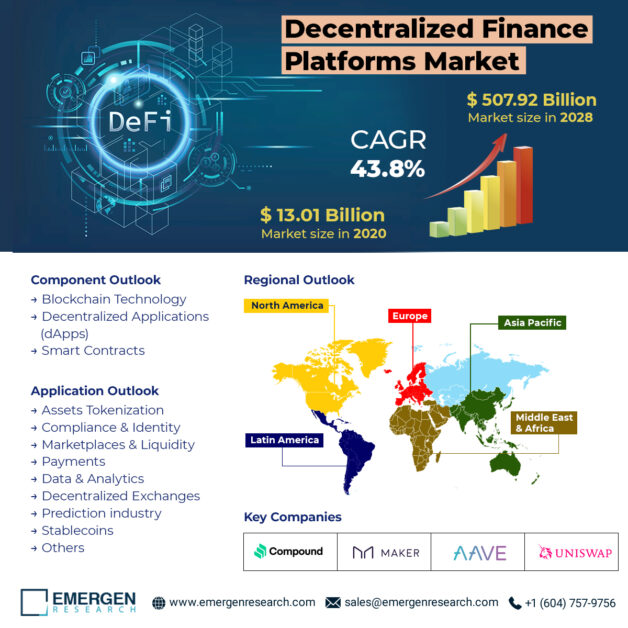![]()
According to the most recent analysis by Emergen Research, the market for Decentralized Finance (DeFi) platforms is anticipated to grow steadily at a CAGR of 43.8% to reach USD 507.92 billion in 2028. DeFi is a decentralised financial platform that can take the place of intermediaries like banks and brokerages. It controls interest payments and allows for the automatic execution of smart contracts. These elements are anticipated to fuel the market for DeFi platforms’ revenue growth.
One of the main factors influencing market growth is the financial sector’s profound transformation as a result of the acceptance of DeFi (Decentralized Finance). Over the past five years, interest in how DeFi and decentralised platforms interact on the blockchain has grown. The ability of DeFi to remove middlemen from financial processes has increased adoption. Additionally, the use of DeFi in the insurance sector has had the greatest impact because the traditional system has cumbersome processes, paperwork, and audit systems.
DeFi platforms were used to increase efficiency, which helped the industry grow. Since developers use DeFi tokens for in-app purchases, a rise in e-sports and gaming has also been noted as a key driver for DeFi platforms. On the blockchain, trading games and collectibles are also growing in popularity as genres because they allow users to trade tokens and develop their own ecosystem. For instance, DeFi platforms like Augur allowed users to wager on a variety of things, including sports, economics, and world events. Over the course of the forecast period, it is expected that the emergence of blockchain-based prediction platforms will present growth opportunities for the sector.
Transparent financial transactions on DeFi platforms and real-time payment settlements are significant market growth drivers. DeFi platforms use smart contracts to automate a variety of financial services. Users can access services like borrowings, derivatives, and margin trading through this peer-to-peer financial services system without the need for a central middleman. DeFi platforms, however, are different from traditional banks, and users may encounter various risks when transacting.
The benefits provided by DeFi technology providers are fostering the sector’s expansion. The system abolishes the control that banks and other financial institutions have over money, financial products, and financial services. Additionally, it eliminates the service usage fees that banks and other financial institutions impose. DeFi platform features include the ability to transmit money anywhere in the world, store money in cryptocurrency wallets, and trade tokenized versions of investments like stocks and mutual funds. It is anticipated that the accessibility of DeFi platforms will increase their use as anyone with an internet connection can use them without authorization.
For instance, in December 2020, Trust Token unveiled the TrueFi DeFi lending system, which enables users to consistently earn high returns. This approach provides qualified customers with quick, fixed-term loans with fixed rates and no additional collateral requirements. Within 24 hours of launching its platform, it had amassed 35 million USD in Total Value Locked (TVL). TrueFi is already being used by Alameda Research, a quantitative cryptocurrency trading firm that founded the cryptocurrency derivatives exchange FTX. The following are a few of the leading companies in the global Decentralized Finance (DeFi) market: Compound Labs, Inc., MakerDAO, Aave, Uniswap, SushiSwap, Curve Finance, Synthetix, Balancer, Bancor Network, and Badger DAO.
Several Important Report Highlights
TrustToken introduced the DeFi lending protocol, TrueFi, in December 2020. This platform enables users to generate stable, high returns and provides approved borrowers with quick, fixed-term, and fixed-rate loans without the need for collateral. Within 24 hours of going live, the platform recorded a total value locked (TVL) of USD 35 million. Alameda Research, a quantitative cryptocurrency trading company that trades on the FTX cryptocurrency derivatives exchange, is already utilising TrueFi.
Given that smart contracts are the foundation of DeFi protocols and applications, they accounted for a sizeable portion of revenue in 2020. Blockchain-based applications with access to financial institutions are referred to as smart contracts. With specific guidelines for when, how, and to whom these assets can be released, smart contracts serve as custodians of digital transactions.
Due to new anti-terrorism laws, like the EU’s universal legal framework, the DeFi platform market in Europe accounted for a sizable revenue share in 2020. The U.K. in particular has been one of the hubs of fintech innovation in Europe. After the United States and Singapore, the region has the third-largest centre for DeFi platform innovation.
SOURCE: https://www.emergenresearch.com/industry-report/decentralized-finance-platforms-market



